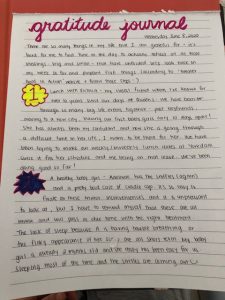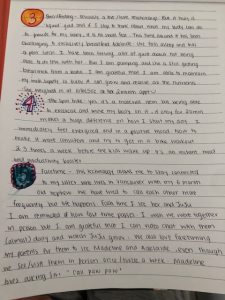
 There has been an abundance of research on the positive benefits of writing in a journal to improve mental health (Ackerman, 2018). For this task, I wanted to try journaling by hand writing a page about gratitude. Personally, I prefer putting pen to paper as it was calming for my senses: the crinkle of paper, the smoothness of the ink and the controlled movement of the strokes. Writing involves more of an investment in the process. When my mind was full of thoughts, I had to deliberately slow down to put all those ideas onto the page. Studies have shown the advantages of handwriting over typing such that “areas of the brain correlated with working memory and encoding new information were more active during handwriting.” and impacts the way we learn. (Jones, 2020). If there was a mistake on the page, I would simply cross it out and move on, leaving a mark of imperfection behind. Since it was a personal journal entry, it was not necessary to edit, rather to continue on with my reflection as my feelings became clearer. If it were in a mechanized form, I would keep reassessing my work and lose the authenticity of my initial emotions. The obvious drawback is the time consuming nature of writing over mechanized forms.
There has been an abundance of research on the positive benefits of writing in a journal to improve mental health (Ackerman, 2018). For this task, I wanted to try journaling by hand writing a page about gratitude. Personally, I prefer putting pen to paper as it was calming for my senses: the crinkle of paper, the smoothness of the ink and the controlled movement of the strokes. Writing involves more of an investment in the process. When my mind was full of thoughts, I had to deliberately slow down to put all those ideas onto the page. Studies have shown the advantages of handwriting over typing such that “areas of the brain correlated with working memory and encoding new information were more active during handwriting.” and impacts the way we learn. (Jones, 2020). If there was a mistake on the page, I would simply cross it out and move on, leaving a mark of imperfection behind. Since it was a personal journal entry, it was not necessary to edit, rather to continue on with my reflection as my feelings became clearer. If it were in a mechanized form, I would keep reassessing my work and lose the authenticity of my initial emotions. The obvious drawback is the time consuming nature of writing over mechanized forms.
References:
Ackerman, C.E. (2018, May 14) 83 Benefits for Journaling for Depression, Anxiety and Stress. Positivepsychology.com. Retrieved from: https://positivepsychology.com/benefits-of-journaling/
Gratitude Journal. Retrieved on June 5, 2022. Greater Good in Action. Retrieved from: https://ggia.berkeley.edu/practice/gratitude_journal
Jones, A.M. (2020, October 4) New study suggests handwriting engages the brain more than typing. CTV News Health. Retrieved from: https://www.ctvnews.ca/health/new-study-suggests-handwriting-engages-the-brain-more-than-typing-1.5132542